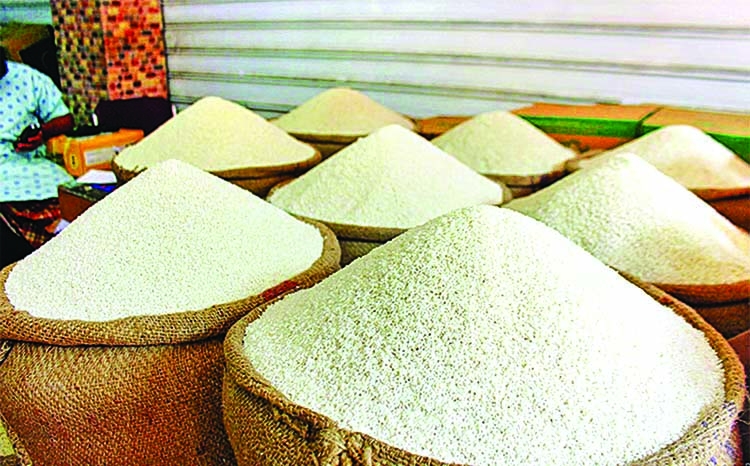
Rice to be imported privately

The government has decided to import rice privately to keep the market stable, says Food Minister Sadhan Chandra Majumder.
The decision came at a meeting of the Food Planning and Monitoring Committee on Monday amid the soaring prices of rice in the country despite the harvest season.
The meeting resolution will soon be sent to the prime minister before determining the steps to follow, the minister said.
"We've discussed importing the rice duty-free. We'll ensure that the farmers, market and others related [to the rice trade] don't face losses. The prime minister will give the final decision on the matter," Sadhan said after the virtual meeting, bdnews24 reports.
On the ongoing crackdown, he said the consumers are benefiting from the success of the drives. These operations to identify illegal rice hoarders will continue.
The spike in prices amid the Boro paddy harvest season prompted the government to initiate a crackdown on unauthorized hoarding by traders.
Rice prices fall when the products of the Boro season arrive in the market, but this time the staple is getting costlier.
Wholesalers say the mills have raised prices. The mill owners have blamed a rise in the prices of paddy this season for the spike in rice prices.
Speaking at a meeting on the collection of paddy during the Boro season at the end of last month, Sadhan had brushed aside the mill owners' claim, alleging that they were engaged in an "evil competition".
He had said mill owners are hoarding newly produced paddy of this Boro season and releasing rice from old stocks.
At another meeting on market monitoring last month, the minister had said the government will encourage rice imports by lowering taxes if it was necessary to ease the consumers' suffering.
Meanwhile, India's surprise ban on wheat exports prompted rice traders to increase purchases and place unusual orders for longer-dated deliveries, fearing the world's top rice exporter may restrict those shipments as well.
In the last two weeks, traders have signed contracts to export 1 million tons of rice for shipments from June through September and are opening letters of credit or LCs quickly after signing deals to ensure the contracted quantity will be sent even if India restricts exports, Reuters reported.
Those forward purchases come on top of roughly 9.6 million tons of rice already shipped out of India this year - in line with record 2021 shipments - and may reduce the amount of grain available for other buyers during the coming months as loading schedules fill.
"International traders pre-booked for the next three to four months and everybody opened LCs to ensure business continuity," said Himanshu Agarwal, executive director at Satyam Balajee, India's biggest rice exporter.
Overseas buyers are looking for Indian rice because it is far cheaper than rivals, said BV Krishna Rao, president of the All India Rice Exporters Association.
Indian 5% broken white rice is offered between $330 to $340 per ton on a free-on-board (FOB) basis, significantly lower than Thailand's $455 to $460 a ton and Vietnam's $420 to $425, dealers said.
Thailand and Vietnam are not able to compete with India and they are trying to explore ways to support prices, Thailand's government has said.
If India restricts exports, global prices could jump sharply, said a New-Delhi-based dealer with a global trading house.
"Indian rice is more than 30% cheaper than other destinations. Poor buyers in Asia and Africa would be forced to pay very high prices if India restricts exports. That's why there is a rush to buy Indian rice," the dealer said.
India exported a record 21.5 million tons of rice in 2021, compared with combined exports of 12.4 million tons by Vietnam and Thailand.
Editor & Publisher: S. M. Mesbah Uddin
Published by the Editor from House-45,
Road-3, Section-12, Pallabi, Mirpur
Dhaka-1216, Bangladesh
Call: +01713180024 & 0167 538 3357
News & Commercial Office :
Phone: 096 9612 7234 & 096 1175 5298
e-mail: financialpostbd@gmail.com
HAC & Marketing (Advertisement)
Call: 01616 521 297
e-mail: tdfpad@gmail.com